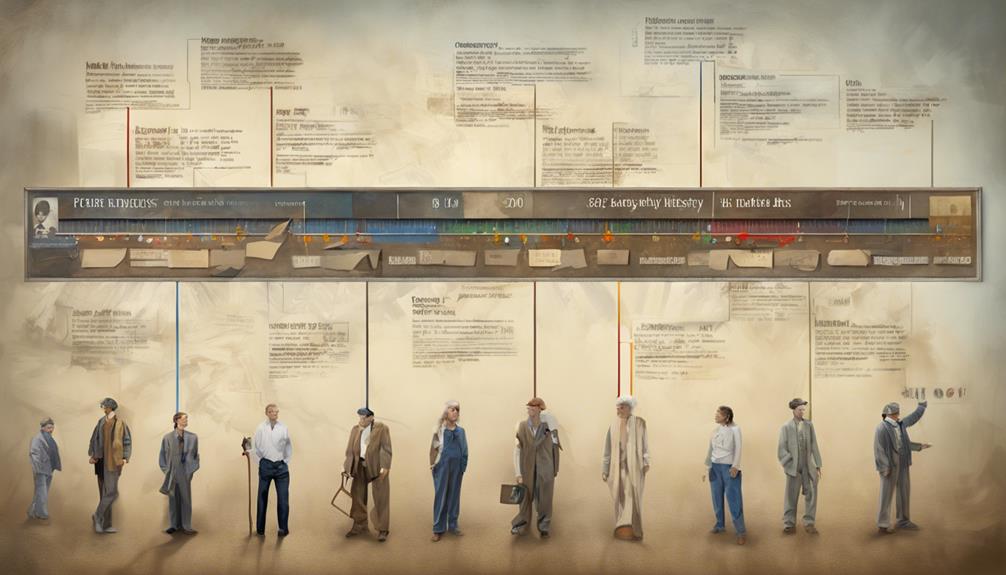Apartment background checks commonly look back 7-10 years to review credit, criminal, and rental history. Landlords examine recent data to gauge tenant suitability based on financial responsibility and past behaviors. Both credit and criminal histories reflect on applicants' reliability and potential risks. Evaluating recent rental history provides valuable insights into the prospective tenant. This time frame allows landlords to make informed decisions about potential renters.
Key Takeaways
- Credit checks cover 7-10 years for financial responsibility assessment.
- Criminal background checks assess recent history and offense nature.
- Negative credit details can remain on record for 7-10 years.
- Landlords can reject based on financial concerns or property care issues.
- Consistent application of rejection criteria is crucial to avoid discrimination.
Typical Timeframe for Rental Background Checks

Typically, landlords conduct rental background checks that investigate into the past 7-10 years to assess a potential tenant's history and behavior patterns. During these checks, landlords look at various aspects such as credit history, criminal history, and rental history to make informed decisions.
The focus on the past 7-10 years enables landlords to gain insight into recent behaviors and trends that may affect a tenant's suitability.
When landlords explore a tenant's credit history, they aim to understand their financial responsibility and debt management over the specified timeframe. This information helps landlords gauge the tenant's ability to meet rent obligations promptly.
Additionally, examining the criminal history within the past 7-10 years allows landlords to identify any concerning patterns or past behaviors that could pose risks to other tenants or the property.
Criminal History Considerations
When evaluating potential tenants, landlords often assess criminal history, including felonies, misdemeanors, and arrests, to make informed decisions regarding apartment rentals. Convictions hold more weight than arrests in the criminal background check process.
Certain offenses, such as violent crimes or drug-related offenses, may lead to disqualification from renting an apartment. Landlords may also take into account factors like rehabilitation efforts or the time that has passed since the offense occurred when reviewing an applicant's criminal history.
Additionally, some states have implemented 'ban the box' laws, which regulate when and how criminal history can be considered in apartment background checks. These laws aim to provide individuals with criminal records a fair chance at securing housing by delaying inquiries into their past convictions until later in the application process.
Credit History and Financial Background

Landlords evaluate applicants' credit history and financial background to assess their financial responsibility when considering renting an apartment. Typically, landlords review credit reports spanning the past 7-10 years to gauge financial habits.
Negative credit information, like late payments or bankruptcies, can linger on a credit report for up to 7 or 10 years respectively, potentially raising concerns during the evaluation process. Factors such as a lower credit score, indicative of past financial mishaps, may impact the rental application.
Landlords prioritize recent financial history and patterns to assess an applicant's financial responsibility accurately. Responsible financial behavior over time is a key consideration for landlords, as they seek tenants who demonstrate sound financial management.
Maintaining a positive credit history and stable financial background can greatly enhance an applicant's chances of securing a rental apartment.
Rental History Verification
Applicants' rental history plays an important role in landlords' assessments, as they often verify past tenancies to evaluate payment habits and tenant behavior. Rental history verification is a vital component of the tenant screening process, allowing landlords to contact previous landlords to inquire about payment history, damages, and any lease violations.
Positive rental history, characterized by timely payments and respectful tenancy, can greatly enhance a rental application's strength. By providing references from previous landlords, applicants can bolster their credibility and reliability during the application process.
Landlords typically focus on recent rental history to gauge a tenant's behavior and reliability, as it offers insights into how the individual may treat the property and fulfill their lease obligations. This thorough examination of rental history is crucial in ensuring that tenants will be responsible and respectful occupants.
Legal Protections for Tenants

Legal protections for tenants encompass various laws and regulations aimed at safeguarding individuals from discrimination and securing fair treatment in the rental housing market.
The Fair Housing Act serves as an essential federal law that prohibits discrimination based on protected classes like race, color, religion, sex, national origin, disability, and familial status. In addition to federal protections, some states have their own laws with additional protected classes such as sexual orientation or source of income.
When it comes to tenant screening background checks, landlords are required to apply criteria consistently to avoid potential discrimination claims. Tenants also have rights under the Fair Credit Reporting Act to dispute any inaccurate information found during background checks.
If a rental application is denied based on background check results, landlords must follow legal procedures, and tenants have the right to seek legal advice to secure fair treatment and adherence to state laws.
Apartment Background Check Process
Apartment background checks involve reviewing rental, employment, credit, and criminal histories. The process typically takes 48-72 hours to complete, with the background check itself lasting 1-3 hours.
During this time, landlords verify applicants' information to assess their suitability as tenants.
Time Frame Considerations
When undergoing an apartment background check process, landlords typically review credit and employment history within the past 7-10 years. This timeframe allows landlords to assess tenant reliability by examining patterns of behavior over a significant period.
Negative credit information, such as late payments or defaults, can remain on a credit report for up to 7 years, while bankruptcies may be reported for up to 10 years. The Fair Credit Reporting Act regulates the reporting of negative information, ensuring that landlords receive accurate and up-to-date data within the specified timeframe.
Information Verification Process
During the information verification process for apartment background checks, landlords typically review rental record, work history, credit history, and criminal background. This process aims to evaluate a tenant's financial accountability, stability, and potential risk factors.
Landlords often scrutinize rental record to check for any prior evictions, tardy payments, or property damage. Work history verification helps guarantee that tenants have a steady income to fulfill rent responsibilities. Credit history assessment focuses on identifying any outstanding debts, bankruptcies, or low credit ratings that may indicate financial difficulties. Criminal background checks are performed to evaluate any potential safety hazards posed by a tenant.
Red flags that landlords watch out for include frequent moves, evictions, unsatisfactory work history, low credit ratings, and criminal records. Addressing these concerns can be accomplished by providing references, being transparent about any issues, offering a larger deposit, or agreeing to a longer lease period.
Apartment Background Check Scope

Apartment background check scope encompasses the timeframe in which the check is conducted, the duration for which information is considered, and the rights of landlords to reject applicants based on the findings.
Understanding the timeframe and coverage of background checks is essential for applicants navigating the rental process and preparing for potential landlord decisions.
Background Check Timeframe
The timeframe for apartment background checks typically spans the past 7-10 years of an applicant's history. When assessing the duration and scope of background checks for rental applications, several key points should be kept in mind:
- Credit Information: Negative credit details, such as late payments or defaults, can be reported for up to 7 years, while bankruptcy may show for up to 10 years.
- Consistent Standards: Landlords must adhere to uniform standards when applying background check criteria to all applicants fairly and without discrimination.
- Fair Housing Laws: The Fair Housing Act requires landlords to evaluate background check information in a non-discriminatory manner, ensuring that all applicants are treated equally.
- State Laws: State laws may vary regarding how far back certain background information can be evaluated for rental applications, so it's crucial to be aware of the specific regulations in place.
Information Coverage Duration
Landlords conducting background checks for apartments typically focus on gathering information that spans a specific duration to assess applicants thoroughly.
When assessing background checks for apartment rentals, the coverage duration varies depending on the type of information being reviewed. Credit checks often cover 7-10 years of credit history, encompassing payment patterns and credit scores. Negative credit information, such as bankruptcies, can remain on reports for up to 7-10 years.
Regarding criminal background checks, landlords may look at both convictions and non-convictions, prioritizing recent history and the nature of the offenses. It's essential for landlords to apply consistent standards in their background checks to adhere to federal fair housing laws.
Landlord Rejection Rights
When conducting background checks for apartments, rejection rights empower property owners to make informed decisions based on financial and property care considerations. Landlords hold the responsibility to ensure that their tenants are suitable for the property, which may involve declining applicants for various reasons.
Here are some key points to keep in mind regarding landlord rejection rights:
- Financial Responsibility: Landlords can decline applicants if their tenant screening report raises concerns about their ability to meet financial obligations.
- Property Care: Property managers have the right to decline applicants if past behavior indicates a lack of care for the property.
- Criminal History: Landlords may use criminal history as a factor in declining applicants, but must do so in compliance with fair housing laws.
- Fair Housing Laws: It's important for landlords to apply rejection criteria consistently to all applicants to avoid potential violations of fair housing laws.
Cost and Coverage of Background Checks
Typically ranging from $30 to $200, application fees for background checks are a standard part of the apartment rental process. Landlords often use these fees to cover the cost of conducting thorough tenant background checks. The coverage of these background checks can vary, but they commonly include criminal history, credit checks, rental history, and employment verification. Some states regulate how much landlords can charge for application fees to guarantee fairness for tenants.
A comparison of different application fee structures can help tenants find cost-effective options. For instance, Brixbid offers a flat application fee of $65 for access to up to 10 applications within 30 days, potentially resulting in significant savings for those applying to multiple apartments. Generally, the cost of a background check is encompassed within the application fee. This practice simplifies the process for tenants, as they only need to pay one fee to cover all necessary checks.
| Application Fee Provider | Cost | Coverage |
|---|---|---|
| Brixbid | $65 | Criminal history, credit, rental, employment verification |
Tenant Rights and Legal Aspects

Tenants frequently benefit from understanding their rights and the legal aspects surrounding background checks during the apartment rental process. Here are some key points to keep in mind:
- Application Rejection Notice: Landlords must provide notice if an application is rejected, as mandated by tenant rights.
- Contact Information Requirement: The Fair Credit Reporting Act requires landlords to provide contact information for the entity that provided the background check report.
- Limitations on Reporting: Outdated negative information can't be included in background checks, ensuring fairness for tenants.
- Criminal Record Policies: Landlords must align their policies on criminal records with legal requirements to avoid discrimination.
Frequently Asked Questions
What Background Check Do Most Landlords Use?
Most landlords typically use background checks that focus on criminal, credit, and rental history. They often look at recent patterns of behavior within the past 7-10 years. Some states have specific limitations on the depth of background checks.
How Far Back Do Most Criminal Background Checks Go?
Most criminal background checks typically go back 7-10 years for apartments. Landlords review convictions, not just arrests, during this period. Serious offenses like violent crimes or drug-related charges may disqualify applicants, but rehabilitation and time passed are considered.
How Extensive Are Background Checks for Apartments in Texas?
Landlords in Texas conduct extensive background checks for apartments, examining credit reports, rental history, employment verification, and criminal backgrounds. These checks typically span the past 7-10 years, helping landlords make informed decisions and safeguard their properties.
Can You Deny a Tenant for Criminal History in Texas?
In Texas, landlords can deny a tenant for criminal history if it poses a risk to the property or other residents. Consideration of the nature and recency of the offense is essential for making informed decisions.
Conclusion
To wrap up, tenants can rest assured knowing that the background check process for apartments typically goes back a few years.
However, it's always a good idea to be upfront about any skeletons in the closet. After all, honesty is the best policy…unless you're trying to hide that one time you accidentally burned down a kitchen making toast.









